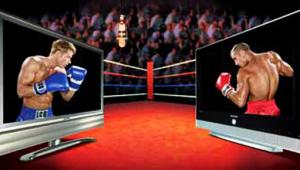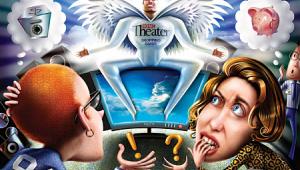Deep Cover Page the Second
The name pretty much says it all. I make a point of leafing through Best Buy's new flyer every Sunday, marveling at the assortment of loss-leader deals in the many departments. They really do carry just about everything—hardware, software, and accessories—that a home entertainment buff could want. I personally have parted with my hard-won cash within their walls, most recently to buy the batteries and film I needed for this article. Armed with a tape recorder and my hidden agenda scribbled on a few tiny Post-Its, I immersed myself in the role of Anonymous Z, consumer.
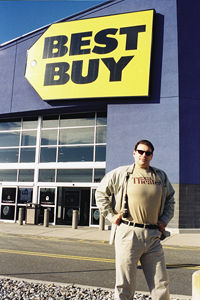 A New York City Best Buy location was my first stop. Manhattan real-estate rules apply, as street-level retail space comes at such a premium that often the serious merchandise is displayed one flight either up or down. Body traffic was brisk in the cockroach-free underground electronics mecca, despite the rigid, prison-like layout. This Best Buy was complete with guards and tables/stacks of boxes here and there to impede the flow. I wove through packed aisles to the shadowy recesses of the home theater department, where an extremely polite, earnest, and patient salesman agreed to answer my questions while ringing up a customer.
A New York City Best Buy location was my first stop. Manhattan real-estate rules apply, as street-level retail space comes at such a premium that often the serious merchandise is displayed one flight either up or down. Body traffic was brisk in the cockroach-free underground electronics mecca, despite the rigid, prison-like layout. This Best Buy was complete with guards and tables/stacks of boxes here and there to impede the flow. I wove through packed aisles to the shadowy recesses of the home theater department, where an extremely polite, earnest, and patient salesman agreed to answer my questions while ringing up a customer.
About HDTV, the succinct expert informed me that the benefit lies in the signal, which offers three times the resolution of standard-def TV and is accessible on 10 channels. He added, "All HDTVs are HDTV-ready. If you have a digital cable box, you'll get the HD signals."
After conferring with a coworker, he explained DLP as "Digital Light Processing. That's as good as it gets. It's like rear-projection: There are three light bulbs—red, green, and yellow—and it goes up to this computer chip that has 900,000 mirrors." The placards on nearby DLP sets also defined the abbreviation and offered long lists of product features.
What about plasma? "Plasma's gas. The only difference between DLP and plasma is that you can hang plasma on a wall. DLP, you can't. I'd suggest you get [plasma] professionally installed." Lifespan? "25,000 hours. Two to three years. And when your plasma goes, that's it—unless you get a warranty through us." Who can blame a salesman for pitching the extended warranty? Apparently that's a big part of the training, right after the drug test and before Acceptable Bathroom Breaks.
 Then I suppose I began to push my luck. What about LCOS? "No information on that." Progressive scanning? "If you have a high-definition signal, it makes DVD look a little bit crisper. It would be useful if you had a high-definition signal." I can only imagine that he meant component video high-definition inputs, but even there my gentle giant with a nametag wasn't entirely accurate.
Then I suppose I began to push my luck. What about LCOS? "No information on that." Progressive scanning? "If you have a high-definition signal, it makes DVD look a little bit crisper. It would be useful if you had a high-definition signal." I can only imagine that he meant component video high-definition inputs, but even there my gentle giant with a nametag wasn't entirely accurate.
DVD-Audio and SACD? "What do you mean, 'DVD-Audio'? Oh, DVD-Audio. VCDs. You're talking about the future, five to 10 years from now. There's only like maybe 10 records that have that." Ouch. Any difference between the two? "You get a better picture with that first one you said." Better picture? I bit my lip, lest my cover be blown wide open.
His one-word assessment of high-definition DVD—"future"—ended our video research and freed me to talk to a casually uniformed audio maven. Did he know where to place 5.1 speakers? "Definitely. Put the bass speaker on the side of the TV." At this point, he helped himself to my flyer and proceeded to reposition the Post-Its as if they were the speakers in my floorplan. "One here, one here, left and right. Back: Bring it up on the rear, both sides, and you have your center speaker, that's the thinner one most of the time like this right here. You're going to put that on top of the TV." Between his props and his penchant for speaking with his hands, he made his point eloquently.
In a more-spacious but still labyrinthine store closer to home in suburban New Jersey, a Best Buy rep eagerly approached me, tackling my inquiries single-handedly and taking advantage of the wide assortment of items on display to make his points with proof, not just words. "Images are five to seven times clearer in high-definition than they are in standard resolution. . .[which] is usually about 480 interlaced. In high-definition, it's either going to be 1,080 [interlaced] or 720 progressive." He went on to extol the virtues of 720p over 1080i while lamenting its limited availability. For a visual comparison, he showed me side-by-side sets.
As for DLP, it "has a chip inside with about a million small mirrors. A bulb shines through the mirrors onto a color wheel, and that's how you get your image." Plasma? "Their lifespan is usually about 20,000 to 25,000 hours. Depending on how you watch TV, that can be anywhere from five to 10 years." So much longer than in New York? Must be that urban blight. "Eventually in about three to four years, the gas will start to burn out of it, but you can have the gas refilled. It can get expensive, maybe $1,500 or $2,000." And, "Yeah," you can hang it on the wall yourself."
LCOS? Without hesitation: "Liquid crystal on silicon." He sailed through progressive scanning and 5.1 setup, peppered with his own tastes and personal configuration, yet the uninformed pessimism toward high-resolution audio formats persisted. "DVD-Audio. Super Audio Compact Disc. Right now, there are only three models that do that." Are there many titles available? "Not at all," although the discs are sold right there at Best Buy.
As confident and forthcoming as these gentlemen were, might a field trip outside their own departments do them some good?—Chris Chiarella
Circuit City
I have a unique perspective on this establishment compared with the stores that my comrades visited. You see, I used to work here. A lot has changed since then, and not all for the better. When I started, each salesperson had to participate in a week-long training camp to learn about the products and how to sell them. As we were all paid on commission, this benefited us (more sales) and the company (more sales and less returns). A trained and knowledgeable sales staff was always Circuit City's calling card. Now, everyone is paid by the hour. Oh how times have changed.
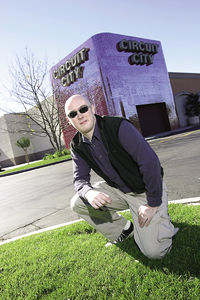 My first stop was at a store just outside of Boston that I not only worked at but also helped renovate into the modern store it is now. It is, as it always was, a very clean, well-organized, good-looking store. My one concern with a sales staff that's paid by the hour was that they'd be as inattentive as the average hourly employee. Fortunately, this didn't seem to be the case. In each department I went to, an employee helped me as soon as I lingered in front of a product. I happened to be standing in front of some inexpensive HD sets when the first salesperson arrived.
My first stop was at a store just outside of Boston that I not only worked at but also helped renovate into the modern store it is now. It is, as it always was, a very clean, well-organized, good-looking store. My one concern with a sales staff that's paid by the hour was that they'd be as inattentive as the average hourly employee. Fortunately, this didn't seem to be the case. In each department I went to, an employee helped me as soon as I lingered in front of a product. I happened to be standing in front of some inexpensive HD sets when the first salesperson arrived.
"Do you need help?"
"You don't know the half of it."
"Huh?"
"Never mind."
According to this salesperson, HDTV is better than regular TV, offering a wider picture with more detail. OK, not bad. What about progressive scanning? Well, that means less black lines and a brighter picture, but you need an HDTV to use it. Close enough. When we moved on to the difference between an HD-ready TV and an HDTV, he started to stumble. "An HDTV just needs the signal to display HD. You need to get a separate box for that." Well, that could have been worse.
When pressed on DLP and LCD, he replied that they're a lot better because there's no burn-in. He even correctly described burn-in. Not too shabby. As for the difference between DLP and LCD, he honestly said that he didn't know. Well, no points off for admitting lack of knowledge, but no points gained for going to find out.
And plasma? "Oh, you don't want that. They're like $7,000 and need to be recharged every two years—and that, like, costs $2,000." It was at this point that bystanders say my head exploded, showering them with little pieces of gray matter (there wasn't that much to begin with). I wanted to interrogate him with extreme prejudice as to who had taught him that, that person's name, and where he or she lives.
Instead, I shook what was eft of my head and fled to the audio department. Here, another seemingly helpful salesperson approached me when I paused in front of an SACD player.
"What's this SACD thing?" I asked innocently.
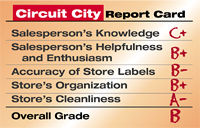 "Oh, that's way better than CD." Correct! However, he went on to compare it to different types of vinyl, which was a little less clear. I almost wanted to say, "What's vinyl?" He then asked me how new my receiver was. Excellent question, to which I replied, "Fairly new." He then turned the nearby SACD player around so that we could see the back. Now, I almost can't fault him for what happened next. Almost. For some reason, only three of the six analog audio connections were hooked up. He looked at this and said, "You need a new receiver because SACD requires a special three-wire digital connection to work." I blinked. And DVD-Audio? "Oh no, SACD is way better than DVD-Audio." Blink, blink. Apparently there are also "only a dozen or so" titles available on SACD. They had a few titles displayed on a poorly set-up end cap that provided speakers so that you could listen to the format (along with the store's noise), but there were no discs in the player to listen to. This time, I fled to the West Coast.
"Oh, that's way better than CD." Correct! However, he went on to compare it to different types of vinyl, which was a little less clear. I almost wanted to say, "What's vinyl?" He then asked me how new my receiver was. Excellent question, to which I replied, "Fairly new." He then turned the nearby SACD player around so that we could see the back. Now, I almost can't fault him for what happened next. Almost. For some reason, only three of the six analog audio connections were hooked up. He looked at this and said, "You need a new receiver because SACD requires a special three-wire digital connection to work." I blinked. And DVD-Audio? "Oh no, SACD is way better than DVD-Audio." Blink, blink. Apparently there are also "only a dozen or so" titles available on SACD. They had a few titles displayed on a poorly set-up end cap that provided speakers so that you could listen to the format (along with the store's noise), but there were no discs in the player to listen to. This time, I fled to the West Coast.
With my high hopes for my old store pummeled into submission by reality, I didn't expect much from the Circuit City near our studio just north of L.A. It turns out, the joke was on me. This store has a similar layout to the one near Boston, but it isn't as well lit and almost seems foreboding. Once again, a friendly sales associate approached me, and once again I barraged him with questions. All the better that I was holding the $40 DVD player that I reviewed for this issue. With the same HD monitor versus HDTV question, he correctly said that an HD monitor needs an HD decoder box. Unfortunately, he also said that an HD-ready TV has the decoder box built-in. With the progressive-scan question, he even used the words "scan lines" and showed an example of an interlaced TV and one that was progressive. Kudos. He then adequately described what plasma, LCD, and DLP are. He must be a ringer; they saw me coming.
This sales associate also knew what DVD-Audio and SACD are and explained them well. The salesperson in the audio department didn't mention that SACD or DVD-Audio sounds better than CD like the chap in the video department did, but he did say that it was 5.1 surround sound. Not bad at all.
I guess it just comes down to what salesperson you happen to get. Or maybe it's just that the West Coast is so much cooler than the East Coast.—Geoffrey Morrison
- Log in or register to post comments




